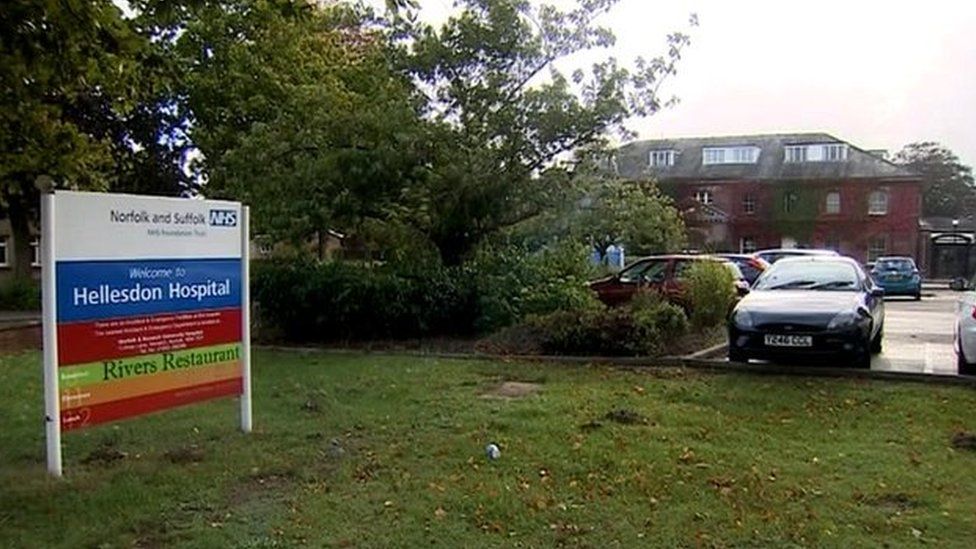Norfolk and Suffolk mental health trust back in special measures
- Published

A mental health trust has been put back in special measures after its board "failed" to address serious concerns raised since 2014, a report says.
The Care Quality Commission (CQC), which rated the Norfolk and Suffolk NHS Foundation Trust (NSFT) as inadequate, has called for a host of improvements.
It is the only such trust in England to be put in special measures and only came out in October last year.
The NSFT said it was "disappointed" by the report.
In its report, the CQC says the board of the NSFT, which was first put in special measures in February 2015, had failed to ensure "unsafe environments were made safe".
CQC's chief inspector of hospitals Ted Baker said: "It is extremely disappointing that on our return to NSFT we found the board had failed to address a number of serious concerns.
"The trust leadership... must ensure it takes robust action to ensure improvements are made and we will continue to monitor the trust closely."
The CQC adds that it has "a lack of confidence" that the trust, which was inspected in July, was using performance data to ensure a quality service.
Its key findings are that:
- There were concerns that "not all potential ligature risks" had been removed and there were concerns about the level of training in suicide prevention
- The NSFT board has not ensured that there are "sufficient staff to meet patients' needs safely"
- There was "insufficient capacity to manage crisis at night". Norwich crisis calls were diverted to a mobile after 21:00 and if the staff member was busy it diverted to a voicemail
- A lack of availability of beds means patients did not "always receive the right care at the right time"
- The trust's Dragonfly unit in Lowestoft was praised for its work with young people
Mother's anger over death
A mother has criticised the NSFT after her son killed himself five days after being released from a mental health unit.
Henry Curtis-Williams, 21, was detained under the Mental Health Act by police after he was seen peering over the top of Orwell Bridge in Ipswich.
He was put in the care of the NSFT but was released the following afternoon. Five days later he hanged himself.
His mother Pippa Travis-Williams, from Ipswich, feels the trust should have done more for her only son.
"I cannot begin to describe how I feel other than I feel I've been completely robbed of the future I had planned for the last 21 years with my son," she told BBC health correspondent Sophie Hutchinson.
"I will never attend his graduation from university, I will never attend a wedding and see him have grandchildren. I've been robbed of everything. It's heart-breaking."
Jane Sayer, director of nursing at the trust, said: "We are really saddened when things do not go as well we would want for our patients, but it is not appropriate to discuss individual cases via the media, particularly when they are the subject of an ongoing complaint, investigation or an upcoming inquest."
The CQC said the trust was being placed in special measures - which means a director will be attached to the trust to ensure the improvement plan is carried out
Julie Cave, NSFT chief executive, said that the trust accepted the recommendations of the CQC report.
"Anyone who cares about mental health services in Norfolk and Suffolk is going to be disappointed in these results, as we are at NSFT," she said.
"In short, we have not made enough significant improvements over the past year and that has resulted in this retrograde step in our CQC ratings and in our progress. For that we apologise to our staff, to our service users and carers, and to our stakeholders."
Analysis
By BBC News health correspondent Sophie Hutchinson
Last year, when the trust was taken out of special measures, many patients and families were shocked and warned it had not improved.
Today, questions are being asked about whether inspectors acted too hastily. The CQC has said it took the decision to take the trust out of special measures because it believed the service was improving. Now, it has said it is very disappointed and will keep a close eye on things, taking further action if necessary.
For trusts that do not improve after special measures there is the possibility of breaking them up and starting again with a new organisation.
There are also questions about funding. The Norfolk and Suffolk trust redesigned its services in 2013 as a response to a 20% cut in its budget, cutting staff and frontline teams. In the five years since, four have seen cuts to its budget.
And other mental health trusts have concerns. A few months ago, a survey by NHS Providers found a third of mental health trust chief executives in England expected their finances to deteriorate over the next six months.
But in a statement, the Department of Health said it is "undertaking probably the most widespread programme of mental health transformation in Europe, supported by our rigorous inspection regime and a record investment of £11.6 billion last year for mental health services".
- Published12 October 2017
- Published28 September 2017
- Published14 October 2016
- Published26 May 2016
- Published28 January 2016
- Published23 February 2015
- Published14 October 2016